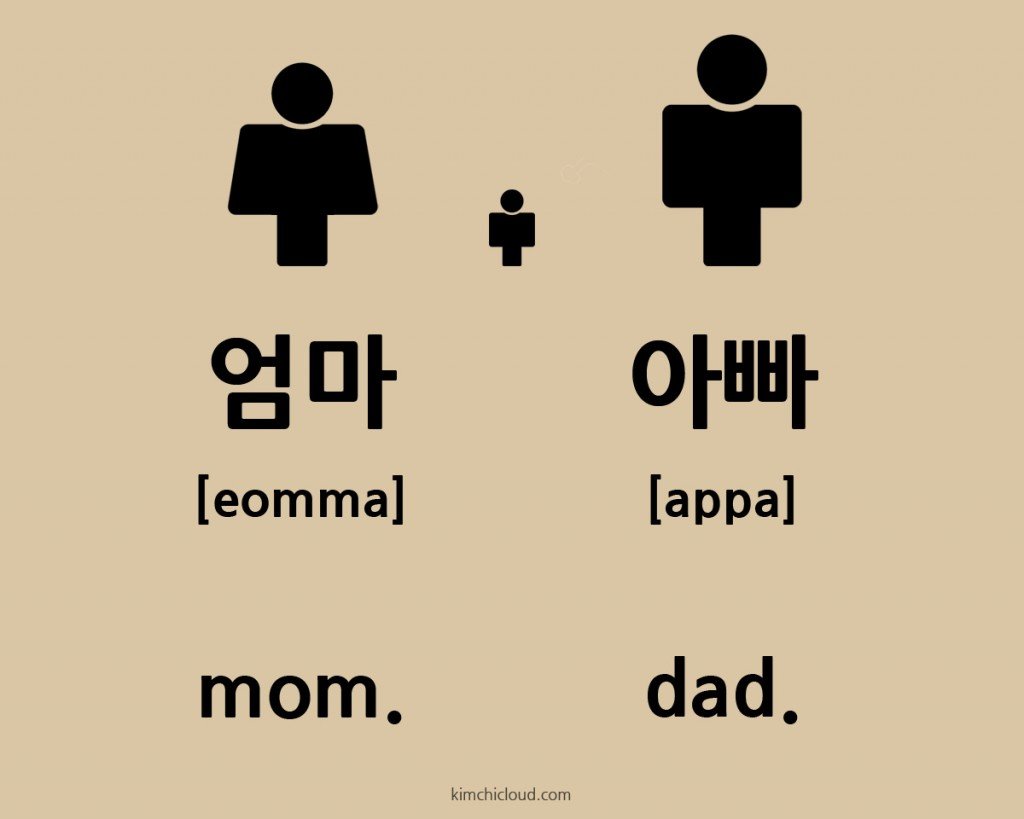엄마 / 아빠 – How To Say MOM and DAD in Korean
Mom & Dad in Korean
In this lesson, we will learn how to say ‘Mom’ and ‘Dad’ in Korean. Family is important and, if possible, more so in Korean culture than in many other countries. Either way, ‘mommie’ or ‘daddie’ is one of the first, if not the first, word we all learn so in a sense, it is the most essential word there is. What’s even more interesting is that almost all languages seem to express these words in somewhat similar ways, even though the other words in the languages can sound completely different in every other way. So to say ‘Mom’ or ‘Dad’ in Korean, here is how you do it!
The Familiar / Informal Way
eomma (In Hangul: 엄마) = Mom
appa (In Hangul: 아빠) = Dad
Now, this literally translates to ‘mom’ or ‘dad’. So in other words, it is a rather casual and informal expression, just like in English. You can use this in everday situations such as talking with your friends and referring to your one of you parents, or while addressing them directly. Now, when you want to say ‘my mom/dad’ in Korean. You would think that you should just say ‘nae/jeh eomma’ (내/제 엄마), however this is incorrect. You should say ‘uri eomma’ (우리 엄마), which literally translates to ‘our mom’. The same is of course true for when you want to say ‘my dad’. So in summary, use when:
- Talking to your own parents.
- Talking about your own parents with friends.
Now, let’s take a look at the more formal expression.
The Formal / Polite Way
eomeoni (In Hangul: 어머니) = Mother
abeoji (In Hangul: 아버지) = Father
These expressions are more formal and and traditional and resemble the English word ‘mother’ and ‘father’ more than the first ones we learned. While it is still common for the older/middle-aged generations to use these expressions when they talk to their own parents, they are not commonly used by the newer generation when talking directly to their own parents. Instead it’s more commonly used when talking about either your own parents in a formal/non-casual setting or when talking to or about someone else’s parents. And just like the phrase above, you need to use ‘uri’ (우리) if you want to say ‘my mother’. To summarize, this is used:
- When some people of the older generations talk to their parents.
- When talking to or about someone elses parents.
Finally, let’s take a look at the most formal way.
The MOST Formal Way
eomeonim (In Hangul: 어머님) = Mother
abeonim (In Hangul: 아버님) = Father
So this is the most formal way to say ‘mother’ and ‘father’ in Korean. You can use these words when the situation requires you to be slightly more polite and formal than in the situation used in the slightly less formal way we learned above. So for example, you can use these words when:
- Meeting a friends parents for the first time
- Meeting your girlfriend or boyfriends parents for the first few times. When form a closer relationship with them, you can use “eomeoni” (어머니) and “abeoji” (아버지).
So this is pretty much all you need to know in order to say mother and father in Korean. For more lessons like this one, please check out our everyday Korean archive, and if you liked this lesson, we would very much appreciate if you would like or share it with your friends. If you have any questions, leave a comment below and we will do our best to help you out!






i like korean and this page also
typos?
shouldn’t the words for mother be:
어머님 and 어머님 ?
Good catch! It’s has been fixed. Thank you, Rose. 🙂